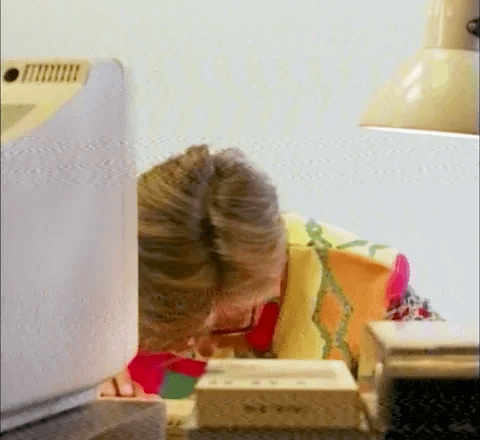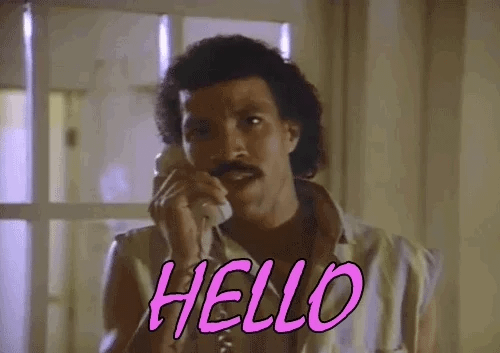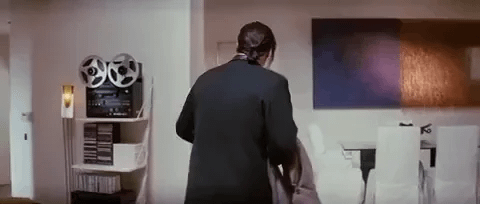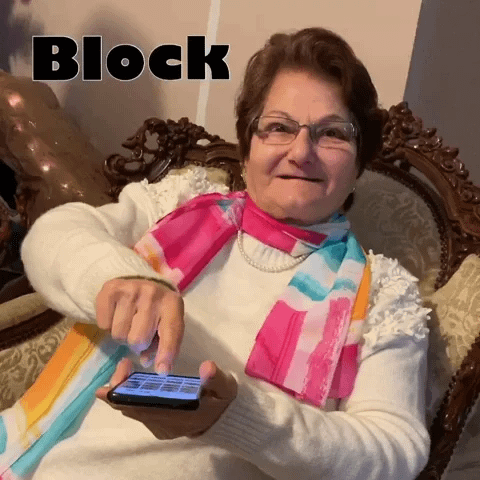Not to be morbid, but have you worked out what your total screen time will be on your deathbed? I did—and it made me start setting some digital boundaries…
“I want to take up as much space as I can in time, stretch out and stroll with nowhere to go, and give myself the largest parcels of time in which to do nothing—to let my obligations slip to the ground, reply to no one, please no one, leave everyone hanging, impolitely, and try to win no one’s favor…”
- Sheila Heti, Motherhood
Much of my twenties was spent agonising over two blue ticks; WhatsApp’s dispassionate way of telling me I was being ignored.
Whether it was at the hands of friends or lovers, I couldn’t understand why someone would read my message, and then not reply.
Whereas I prided myself on texting back right away. I approached my correspondences with meticulous care, crafting thoughtful responses to every last line and eliminating all unread notifications until I was at inbox zero (oh, the satisfaction).
Somewhere along the line, something changed.
Fast forward to today, and ghosting still annoys me, but only if there is something time-sensitive or transactional involved. Like clients dropping off the face of the earth after I’ve laboured over a proposal, or my boyfriend failing to submit his dinner proposals.
Apart from that, I barely bat an eyelid when people take a while to get back to me. We’re all snowed under with WhatsApps, emails and DMs, and I respect people’s right not to be online all the time.
But if only it were that straightforward, and I was simply more relaxed about my digital correspondences. I’m not—I’m positively avoidant.
I’m a late bloomer
Considering I spent the best part of a decade chasing avoidant types, decoding my own anxious attachment style, and then learning not to chase avoidant types, it’s highly ironic that I’m now the person inflicting those taunting blue ticks on others.
That’s life—our personalities and behaviours can change in response to new environments, circumstances and stimuli. In this case, technology.
And so seeing a flurry of messages light up my home screen does not fill me with the same warmth that it used to.
Instead, I feel a mild sense of dread: mentally adding them to the load of little green numbers that lie in wait when I open WhatsApp—something I do multiple times a day. But however often I open the app, and however good my intentions, I increasingly find that I do nothing more than stare at the stack of unanswered messages, then swipe them out of sight again.
That’s the beauty of phones: there’s always something else to distract you from the thing you don’t want to do.
My deathbed screen time
Because it’s not like I let out a sigh of despair over modern technology, then scurry off to write poetry by candlelight. I actually spend a lot of time on my phone, apparently doing everything but reply to all my messages.
According to my iPhone’s terrifying weekly bulletins, I am on my phone for 3-3.5 hours each day.
That’s one whole day a week. Four days a month. 48 days a year. If I carry on at this rate and live to one hundred (which I intend to do, glamorously), I will spend almost 4000 days of my life on my phone. That’s over a decade.
Considering one of my favourite refrains for shirking everything from leisure activities to lifelong ambitions is “I don’t have time”, someone needs to slap me round the face.
And yes, I know—my screen time is positively virtuous compared to most people’s. According to the latest global research, the average person’s screen time is 6 hours and 35 minutes a day. Making their deathbed screen time decades plural.
Revenge communication procrastination?
There’s a Chinese word for going to bed late that translates to “revenge bedtime procrastination”. The idea is that putting off going to sleep, even if we know we’ll suffer the next day, is a subconscious bid to reclaim free time lost to work, where we don’t feel in control of our allotted hours. So basically, an act of revenge against capitalism.
I’m reminded of this concept when I reflect on my newfound toxic traits. Perhaps my communication procrastination comes from feeling that my time is not my own.
Our phones are constantly placing demands on us, giving people access to our time and attention at all waking hours. It would appear I’m resisting this by avoiding my duty to reply to the people I love in a respectably timely manner.
It’s an avoidance that’s misplaced; although I do think it’s important to question the quality of our digital interactions (is sharing memes really the best way to nurture intimacy, or would we be better off having *shock horror* an actual phone call?), intentionally keeping up with my friends and family stands to benefit my relationships and overall wellbeing.
Mindlessly scrolling through Instagram doesn’t.
Unconscious consumption
I know that, comparatively, I am “not that bad” with my phone. So on a day-to-day basis, it doesn’t seem like a “serious” problem. But when I think about the bigger picture of my life, I am, as they say online, shook.
It’s really important to me to be conscious of my consumption and what I do with my time. There are lots of things that I actively and vocally unsubscribe from, whether it’s fast fashion, eating meat, or a corporate job. I plan my days so I can balance all the things I care about and feel productive. One of the main reasons I went freelance was to have more control and agency over my time.
And yet it’s entirely possible that I will fritter away a decade of my life in a social-media-induced stupor, letting the tech overlords mine my personal data in exchange for GRWM videos by a woman I don’t know from Portland, Oregon.
It’s also no wonder that, despite no obvious stressors in my life, I often feel really stressed.
I am spending one day a week plugged into apps that are designed to hijack my body’s reward system, luring me in with the promise of dopamine hits and leaving me feeling strangely empty afterwards.
My thumb has learned to move across the screen with a mind of its own, so that when I do bite the bullet and reply to that message, I find myself scrolling through a set of holiday photos from my friend’s brother’s girlfriend’s cousin, struggling to remember why I picked up my phone in the first place.
Do we all need a slap round the face?
My deathbed screen time fills me with a sense of urgency—the need, individually and collectively, to do something.
When I’m sitting at the dinner table with friends and family I haven’t seen for months, they don’t hear what I’m saying because they are so engrossed by something on their phones. I have had meetings where the other person’s eyes are constantly flickering downwards, their attention divided between our conversation and their incoming texts. I wake up in the night to the blue light of my boyfriend’s phone, which he is looking at because he can’t sleep, because he was looking at his phone before he went to sleep.
I want to shake all of us out of this zombie-like trance. But here’s the catch…
Can we live without it?
There’s no denying that there are also huge positives to modern technology.
My boyfriend and I met on Hinge. I get most of my clients from Slack groups and LinkedIn. Some of my closest friendships have been made and sustained online. I could not live without Spotify.
And from Munya Chawawa’s election satire, to videos of Italians singing from their balconies during lockdown, there are so many moments when I bloody love the internet.
I want to get that decade of my life back to write a book, or learn Spanish, or sit on a park bench and do nothing at all. But I also don’t want to throw my phone in the sea.
[If I could find a GIF of Carrie throwing her phone off a cliff in Sex And The City: The Movie, it would go here]
There’s all the practical stuff I wouldn’t be able to do without it (banking, Ubers, maps, etc.). Also, one of my core values is connection. The time I spend “online”—whether it’s checking in with a friend who lives overseas, or writing this Substack—does give me that thread to loved ones, subcultures, strangers, humanity. It can be draining, yes, but also life-affirming.
I am left, as with a lot of life’s great contradictions, in a pickle. And once again, I am reminded of two of life’s greatest tools: boundaries and balance.
Digital boundaries
Confronted with my deathbed screen time, I thought that what I needed was to be more intentional and disciplined around my phone use. So I set myself some digital boundaries:
I deleted my Instagram and LinkedIn apps, so I can only log on from desktop.
I turned off my WhatsApp notifications.
I allotted myself set times of day to check my messages: nothing when I wake up, emails/work-related stuff when I’m up and about, WhatsApp at lunchtime and early evening, nothing before bed.
The first two have worked pretty well. My average daily screen time is now down to an hour, I don’t feel any sense of social media FOMO (I just ask friends to text me their photos instead) and, in general, I would say I feel more relaxed, peaceful and clearheaded.
But alas, I am only human.
I checked WhatsApp as soon as I woke up this morning. I have replaced mindlessly scrolling through Instagram with hungrily scrolling through Vinted, shoring up huge wishlists of vintage Fendi bags and heavily discounted, mid-range designer clothes. It may be the lesser of two evils compared with Shein ads and Kardashian collabs, but is nonetheless designed to make me buy more shit I don’t need.
Digital balance
Boundaries are, obviously, important and healthy. But as much as our Instagram-therapised culture likes to bang on about them, unfortunately they are one of those things that is easier said than done.
Our fast, instinctive and emotional thinking will often trump our slower, more deliberative and rational thinking. So that however much we know something is bad for us, we will still go ahead and do it anyway.
Rather than always trying to optimise ourselves, sometimes the best thing we can do is accept our own humanness and understand that life is all about balance (and potentially do something about the tech overlords, but that’s a topic for another day).
Hopefully, there will be more and more days when I defy the magnetic pull of my phone and gambol merrily through the woods instead.
But there will also be days when I lie in bed, double-chinned and undeniably joyful, as I watch a man summon a group of turtles by playing Usher’s “Yeah!” on the violin. God bless the internet.
Go on, tell me yours
Unless we are having dinner and you are checking who’s watched your Story, this is a safe, judgment-free space. So please tell me what you think!!! Do you know your deathbed screen time? Does it give you perspective, or would you rather not think about it? How do you feel about digital boundaries and balance? I’d love to hear from you in the comments.
Rainy day reading ☔️
If you are also having a thoroughly British summer, check out some of my most popular posts:
On navigating transitional times (good for the newly-thirty-somethings)
Some thoughts on our changing attitudes towards authenticity (my very first post!)
Thanks for reading and see you in a couple of weeks 👋









